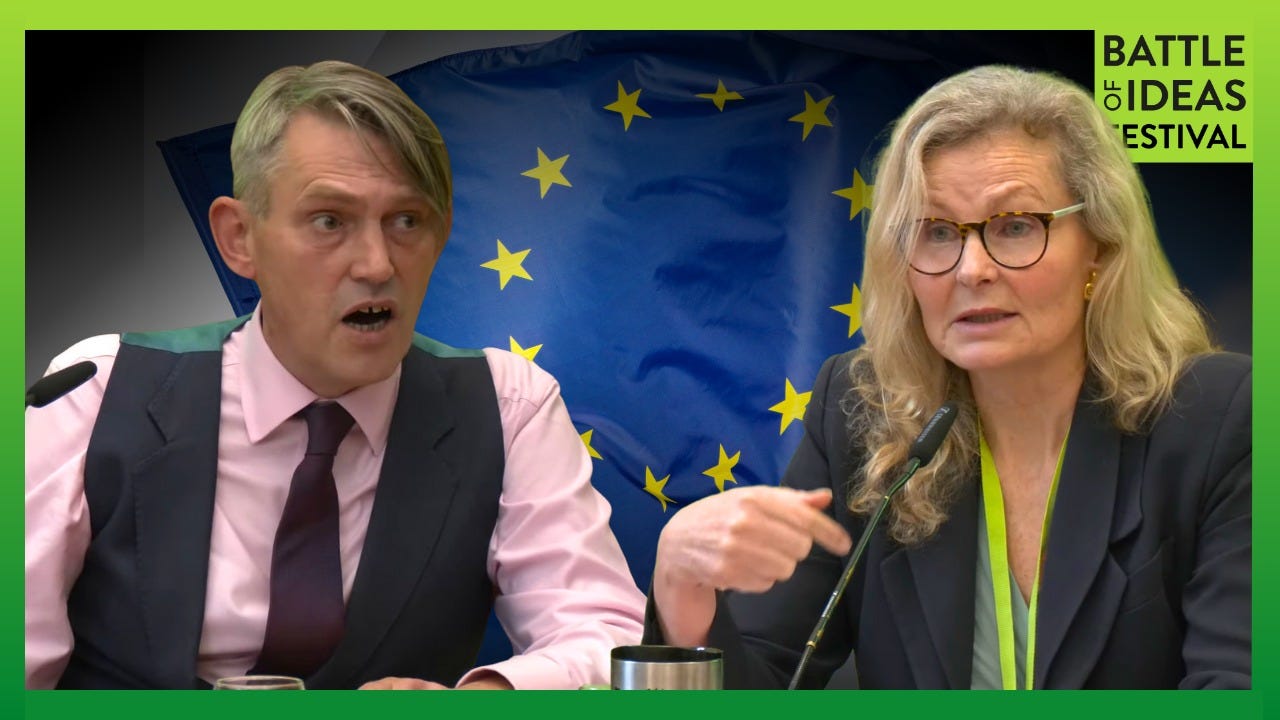Happy birthday, Brexit!
Five years on from the UK's departure from the EU, Brexit remains an enormous achievement in giving voters back their power and stopping the political class from deflecting away its failure.
On the fifth anniversary of Brexit (31 Jan 2020), a couple of reflections on the issue. As an ardent Leaver, I am not impartial on this issue. But I hope that even those of you who voted Remain, or are indifferent on the issue, will note that, regardless, the issue is key for democracy and is still the political backdrop to much of what happens in the UK.
I spoke on a panel debate for the Independent last week. It was a feisty exchange, to say the least, and shows that this is still a viscerally live issue for many people. You can watch it here.

But also, I think this report by Brexit Facts4EU, which presents five years of polling showing a 57% / 43% anti-Brexit trend, is worth reading: With so many reasons to love Brexit, why does the public increasingly want to rejoin the EU?.
To those who follow EU politics, it seems simply bizarre that now would be the time to rejoin the EU. The EU is mired in a deep-rooted economic crisis, engaged in a censorship war against Elon Musk (and all of us), and beset on all sides by populist parties who are breaking down the ‘cordon sanitaire’. Ursula von der Leyen, the EU Commission president, is engaged in the ridiculously bizarre stunt of launching a ‘competitiveness compass’ (which quite literally points in a whole number of different directions). Surely no one can seriously believe the EU has answers to our problems today.
But the case about Brexit has always been much more than a question of practicalities, effectiveness or economics. It is about sovereignty.
This is the point I made in an ill-fated speech to the Oxford Union on 7 November last year, just after the election of Donald Trump. The debate on whether we rejoin the EU was completely chaotic. Internal Oxford Union politics disrupted proceedings (see: Heseltine walks out of Oxford Union after students ‘hijack’ debate). As a consequence, the film of the debate has never appeared. So, never one to let a speech go to waste, you can read my verbatim introduction, lightly edited, below.
We’ve also just added an excellent debate from last year’s Battle of Ideas festival to our thriving YouTube channel, Running back to EU? Labour, Europe and the economy.
Claire Fox’s speech to the Oxford Union
Ladies and gentlemen,
The UK is indeed better off after Brexit: we’re a more independent and democratic country. Brexit means we are now grown up enough to have fewer illusions in who and what are responsible for our successes, as well – of course - as the difficult challenges facing us moving forward. And moving forward is the point. Some of us only saw Brexit as the start of a democratic revolution. So, I am looking forward, not backwards.
I actually feel rather sorry for those of you who seem stuck in the past and keep looking back wistfully – clinging to the idea that Brexit is the ruinous cause of all society’s woes. Certain sections of Britain’s political class seem consumed by a sort of maudlin nostalgia, believing the EU represents all that is virtuous and good – a mythical, ‘sunny uplands’ view of the European Union that is completely outdated.
Also mythical is the historically inaccurate and complacent view espoused by ‘Nostalgist Rejoiners’ of the real lives of millions of working-class people and the version of the state of the UK before the referendum. Their drive to effectively turn back the clock to pre-2016 not only aims to airbrush away the largest popular vote in British history, it also ignores the economic, cultural and democratic alienation of huge swathes of the country in the decades before the Brexit vote.
The Nostalgists seem to assume that low-information, ‘Gammon’ types were duped by fake news and a bus advert, and just didn’t appreciate how well-off and happy they really were when the sensible, know-betters were in charge.
Back to reality. However galling we Leavers find the endless betrayals of the possibilities of Brexit, it remains a cherished accomplishment that means that millions who had previously been patronised, ignored and had policies done to them, rather than being active agents in political life, forced themselves onto the stage of history. It is they – the sovereign people – who became the political game-changers, and one of the great democratic gains is that so many now know they can shape the future. This dynamic trajectory is in stark contrast to the has-beens who long to roll back the years and blame Brexit for everything.
What’s more, the starry-eyed view of the EU itself is an outdated delusion. Any misplaced idealism about a united, federal European project is increasingly a shabby, fading myth. Even ardent Europhiles are sounding the alarm about the Union’s mounting problems. Look at the continent now – at the end of 2024 – and you will see it’s all gone a bit – well – Brexity. For example, European voters – en masse – are turning towards populist, Eurosceptic parties.
Meanwhile, while UK Nostalgists continue to grieve for their beloved globalist antidote to national borders – freedom of movement – EU apparatchiks have been forced to concede that they have lost control of the bloc’s borders and that migration is a source of destabilising tension. The Polish prime minister, Donald Tusk – yes, THAT Donald Tusk, who once described Brexiteers as ‘xenophobes deserving a special place in hell’ – has now suspended asylum claims in Poland and warned would-be refugees coming over the Belarussian border that they will be turned back and deported. This is a refutation of EU law and effectively nullifies the Schengen Agreement.
Then there’s EU cheerleader Olaf Scholz, chancellor of Germany, who has introduced land-border checks. These moves are in defiance of the EU’s supposedly non-negotiable principle guaranteeing passport-free travel. More broadly, we can see that one of Brexit’s key demands – national control of one’s own borders – is now becoming mainstream throughout European nation states.
On the economy, just at a time when our new Labour government suggests that closer alignment with the EU holds the answer to improving growth, Mario Draghi – one of the Union’s most senior Eurocrats and former head of the European Central Bank – has admitted to having nightmares about the EU’s dire economic prospects. His recent 400-page report on European competitiveness concludes that without radical reform, the EU faces decades of ‘the slow agony of stagnant living standards, technological backwardness and geopolitical impotence’.
The significance of the Draghi report can’t be underestimated. It exposes the lie at the heart of the EU project, still being sold here at the Oxford Union tonight. Membership of the EU involves a trade-off. Member states sacrifice swathes of control over critical policy areas to unelected officials and experts, who are entrusted to make economic decisions on the basis they will deliver higher living standards and productivity than if they were left up to nationally elected non-expert politicians, doing the bidding of economically illiterate voters. But Draghi shows that Brussels isn’t living up to its side of the deal.
The facts of the EU’s accelerating decline are startling. Only four of the world’s top tech firms are European. Almost a million manufacturing jobs have been lost in the EU in the past four years. Incredibly, the economies of Italy, Spain and Greece are smaller today than they were when they were decimated by the Euro-crisis and EU-mandated austerity measures over a decade ago. But more shocking is the fate of those EU economies that we most associate with economic dynamism – they are stagnating. In France, the EU’s second largest economy, debt is spiralling to the kind of levels we saw in Italy just before the Euro-crisis.
And look at Germany, traditionally viewed as Europe’s economic powerhouse – it is deindustrialising at a rapid rate. Volkswagen, the crown jewel of the German car industry, recently threatened job-cuts and production-line closures for the first time in its 87-year history. Major chemical and steelmaking companies, and technology giant Siemens, are all cutting jobs and offshoring factories. No wonder, just last night, the German government imploded under the strain.
Importantly, according to Draghi, these economic problems are not glitches but structural features of the way the EU is organised. To quote him: ‘Europe is stuck in a static industrial structure with few new companies rising up to disrupt existing industries or develop new growth engines.’ One key example he uses as undermining innovation and productivity is the stranglehold of hyper-regulation. Draghi urges Brussels to start shredding red tape, noting that 60 per cent of companies in the EU see over-regulation as a barrier to investment and growth. But the problem is that a strict rules-based order, organised around myriad regulations, is the EU’s very proud USP.
Despite such damning warnings about the death-rattle of the EU economy, few in Britain seem to have paid attention. The opposite. We keep being told that closer ties with the EU would be a major benefit to British business. Yet all the signs from the reality on the ground in the Continent now (not some mythical past) show that aligning ourselves with uniform EU rules and regulations would be a burden on the UK economy.
Of course, I concede, the British economy has serious challenges. But on our key question tonight: is Brexit to blame? Would being in the EU resolve matters? Certainly, leaving the uber-protectionist single market has created some barriers for UK businesses. But I contend that Britain’s protracted decline in productivity – the heart of the problem that impairs the competitiveness of British goods – has been evident for at least 25 years and pre-dates Brexit.
Just to note: Leavers always understood that Brexit was about far more than pounds and pence or trade deals. However, we concluded that national sovereignty would force our own politicians to take responsibility for and be answerable to voters for economic outcomes. It was about tearing up excuses.
Let me be frank – and I say this as a Leaver – one thing that always drove me mad before 2016 was the way that Eurosceptics especially rather lazily and cynically blamed Brussels for all and every problem in Britain. How ironic that the still-sulking Nostalgist Rejoiners mirror this distraction strategy with their knee-jerk ‘Blame Brexit’ response to every example of British economic weakness. I’d argue that this lets our own elected politicians off the hook and is a simplistic distraction from tackling homegrown barriers to prosperity.
To conclude, the reason I voted Leave is because the EU is a thoroughly anti-democratic, illiberal institution, led by an unelected Commission – a cabal – designed to ring-fence key political decisions, behind closed doors, away from pesky voters. Because the problem with pesky voters for the technocratic class – as exemplified by what’s just happened in the American election and by the 2016 Referendum – is that they use the ballot box in ways that can lead to existential hysteria when they vote the ‘wrong’ way in defiance of certain sections of an entitled establishment. Now pesky voters all over Europe are equally behaving as an ‘awkward squad’. They indeed illustrate the value of Brexit – it let the genie out of the bottle and proved that the mass of ordinary voters can shake up the status quo.
Those who want to turn back time and stuff the genie back in the bottle regularly declare – if an election goes their way – that the ‘grown-ups are back in the room’. I recall when David Cameron was recently installed in the Lords as foreign secretary and even then, opposition Tory-hating peers got dewy eyed every time he spoke. PHEW, they thought, it’s just like those halcyon days of 2015, before ‘the fall’. And then, just when they relax, those pesky voters lead a populist surge somewhere else in Europe, and now in the USA, and shake things up again.
The political realignment that started with Brexit is sweeping away the deadwood across the Western world and it is changing politics for good. And we are better off for it. The opposition here tonight better get used to it.





